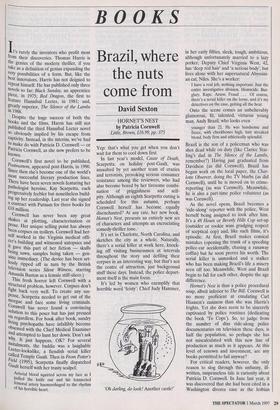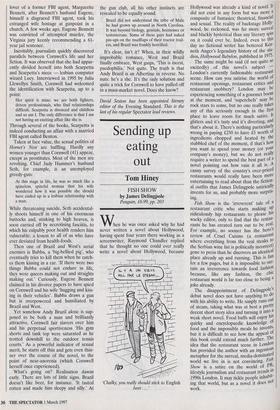BOOKS
It's rarely the inventors who profit most from their discoveries. Thomas Harris is the genius of the modern thriller, if you take as a definition of genius expanding the very possibilities of a form. But, like the best innovators, Harris has not deigned to repeat himself. He has published only three novels so far: Black Sunday, an apprentice piece, in 1975; Red Dragon, the first to feature Hannibal Lecter, in 1981; and, greatly superior, The Silence of the Lambs in 1988.
Despite the huge success of both the books and the films, Harris has still not published the third Hannibal Lecter novel so obviously implied by his escape from captivity. Instead, in the interim, we've had to make do with Patricia D. Cornwell — or Patricia Cornwell, as she now prefers to be known.
Cornwell's first novel to be published, Postmortem, appeared post-Harris, in 1990. Since then she's become one of the world's most successful literary production lines. There have been seven novels featuring her pathologist heroine, Kay Scarpetta, each Progressively feebler but nonetheless build- ing up her readership. Last year she signed a contract with Putnam for three books for £18 million.
Cornwell has never been any great shakes at plotting, characterisation or ,Preise. Her unique selling point has always been corpses on trolleys. Cornwell had her- self worked in the Virginia medical offi- cer's building and witnessed autopsies and it gave this part of her fiction — skulls being sawn, samples being taken — gen- uine immediacy. (The device has been art- lessly ripped off in turn by the British television series Silent Witness, starring Amanda Burton as a female stiff-slicer.) This fresh horror left Cornwell with a structural problem, however. Corpses don't fight back very well. To create any sus- pense, Scarpetta needed to get out of the morgue and face some living criminals. Cornwell has never found a convincing solution to this poser but has just pressed on regardless. For book after book, sundry living psychopaths have infallibly become obsessed with the Chief Medical Examiner and attempted to hunt her down. Don't ask why It just happens, OK? For several instalments, the baddie was a laughable Lecter-lookalike, a fiendish serial killer called Temple Gault. Then in From Potter's Field (1995), Scarpetta finally dispatched Gault herself with her trusty scalpel:
Arterial blood squirted across my face as I Pulled the knife out and his transected femoral artery haemorrhaged to the rhythm of his horrible heart.
Brazil, where the nuts come from
David Sexton
HORNET'S NEST by Patricia Cornwell Little, Brown, £16.99, pp. 375 Yep: that's what you get when you don't wait for them to cool down first.
In last year's model, Cause of Death, Scarpetta, on holiday post-Gault, was assaulted by yet another team of crazies and terrorists, provoking serious consumer resistance among the reviewers, who had also become bored by her tiresome combi- nation of priggishness and self- pity. Although an eighth Scarpetta outing is scheduled for this autumn, perhaps Cornwell herself has become equally disenchanted? At any rate, her new book, Hornet's Nest, presents an entirely new set of characters and attempts an excruciating comedy-thriller tone.
It's set in Charlotte, North Carolina, and sketches the city as a whole. Naturally, there's a serial killer at work here, knock- ing off visiting businessmen at intervals throughout the story and defiling their corpses in an interesting way, but that's not the centre of attraction, just background stuff these days. Instead, the police depart- ment itself is the main focus.
It's led by women who exemplify that horrible word 'feisty': Chief Judy Hammer, 'Oh darling do look! Another castle!' in her early fifties, sleek, tough, ambitious, although unfortunately married to a lazy porker; Deputy Chief Virginia West, 42, has 'deep red hair' and 'a serious body', but lives alone with her supernatural Abyssini- an cat, Niles. She's a worker:
I have a real job, nothing important. Just the entire investigative division. Homicide. Bur- glary. Rape. Arson. Fraud . . Of course, there's a serial killer on the loose, and it's my detectives on the case, getting all the heat. Onto the scene comes an unbelievably
glamorous, fit, talented, virtuous young man, Andy Brazil, who looks even
younger than 22. He was handsome and fierce, with cheekbones high, hair streaked blond, body firm and athletically splendid.
Brazil is the son of a policeman who was shot dead while on duty (like Clarice Star- ling's dad in The Silence of the Lambs, remember?) Having just graduated from Davidson (as did Cornwell), Brazil has begun work on the local paper, the Char- lotte Observer, doing the TV blurbs (as did Cornwell), until he is moved on to crime- reporting (as was Cornwell). Meanwhile, he is also a part-time police volunteer (as was Cornwell).
As the novel opens, Brazil becomes a `ride-along' reporter with the police, West herself being assigned to look after him. It's a 48 Hours or Beverly Hills Cop set-up (outsider or rookie wins grudging respect of sceptical cop) and, like such films, it's episodic. At first, Brazil makes comical mistakes (opening the trunk of a speeding police-ear accidentally, chasing a runaway coffin) but he soon proves his worth. The serial killer is unmasked and a stalker who has been making Brazil's life a misery seen off too. Meanwhile, West and Brazil begin to fall for each other, despite the age difference.
Hornet's Nest is thus a police procedural soap, albeit inferior to The Bill. Cornwell is no more proficient at emulating Carl Hiaasen's zaniness than she was Harris's frights. Yet she does seem to be sincerely captivated by police routines (dedicating the book 'To Cops'). So, to judge from the number of dim ride-along police documentaries on television these days, is half the population, so perhaps she has not miscalculated with this new line of production as much as it appears. At this level of renown and investment, are any books permitted to fail anyway?
For critical readers, however, the only reason to slog through this unfunny, ill- written, suspenseless tale is curiosity about Patricia D. Cornwell. In June last year, it was discovered that she had been cited in a Washington divorce case as the lesbian lover of a former FBI agent, Marguerite Bennett, after Bennett's husband Eugene, himself a disgraced FBI agent, took his estranged wife hostage at gunpoint in a church. A few weeks ago, Eugene Bennett was convicted of attempted murder, the Virginia jury keenly recommending a 61- year jail sentence.
Inevitably, journalists quickly discovered parallels between Cornwell's life and her fiction. It was observed that she had appar- ently divided herself into both Scarpetta and Scarpetta's niece — lesbian computer wizard Lucy. Interviewed in 1995 by Julia Llewellyn Smith, Cornwell had welcomed the identification with Scarpetta, up to a point;
Her spirit is mine; we are both fighters, driven professionals, who find relationships difficult. Scarpetta is divorced and childless and so am I. The only difference is that I am not having an exciting affair like she is.
Through several of the books, Scarpetta is indeed conducting an affair with a married FBI agent called Benton.
Taken at face value, the sexual politics of Hornet's Nest are baffling. Hardly any women younger than Cornwell (41) appear, except as prostitutes. Most of the men are revolting. Chief Judy Hammer's husband Seth, for example, is an unemployed greedy-guts:
At this stage in life, he was so much like a spineless, spiteful woman that his wife wondered how it was possible she should have ended up in a lesbian relationship with a man.
While threatening suicide, Seth accidental- ly shoots himself in one of his enormous buttocks and, stinking to high heaven, is soon carried off by necrotising fasciitis, to which his culpably poor health renders him vulnerable: a lesson to all of us who have ever deviated from health-foods.
Then one of Brazil and West's serial enemies is Bubba, a 'big-bellied pig', who eventually tries to kill them when he catch- es them kissing in a car. 'If there were two things Bubba could not endure in life, they were queers making out and straights making out.' Curiously, Eugene Bennett claimed in his divorce papers to have spied on Cornwell and his wife 'hugging and kiss- ing in their vehicles'. Bubba draws a gun but is overpowered and humiliated by Brazil and West.
Yet somehow Andy Brazil alone is sup- posed to be both a man and brilliantly attractive. Cornwell fair slavers over him and his perpetual sportiveness 'His gym shorts and tank top were saturated as he trotted downhill to the outdoor tennis courts.' As a powerful indicator of sexual merit, he starts off thin and gets even thin- ner over the course of the novel, to the point of near-anorexia (which Cornwell herself once experienced).
What's going on? Realisation dawns early. There are lots of little signs. Brazil doesn't like beer, for instance. 'It tasted rotten and made him sleepy and silly.' At the gun club, all his other instincts are revealed to be equally sound.
Brazil did not understand the tribe of Male he had grown up around in North Carolina. It was beyond biology, genitals, hormones or testosterone. Some of these guys had naked pin-ups on the mudflaps of their tractor trail- ers, and Brazil was frankly horrified.
It's clear, isn't it? When, in their wildly improbable romance, West and Brazil finally embrace, West gasps, 'This is incest, paedophilia.' Not quite. The truth is that Andy Brazil is an Albertine in reverse. No nuts: he's a she. It's the only solution and quite a trick for Cornwell to have pulled off in a mass-market novel. Does she know?
David Sexton has been appointed literary editor of the Evening Standard. This is the last of his regular Spectator lead reviews.



























































 Previous page
Previous page